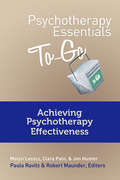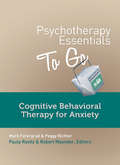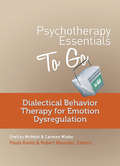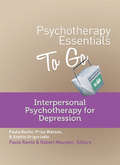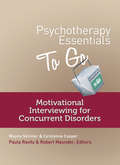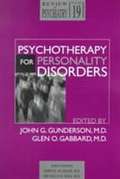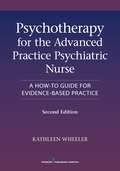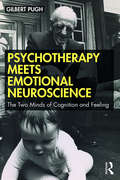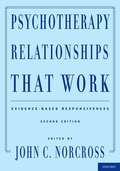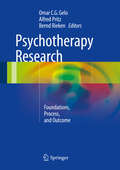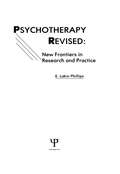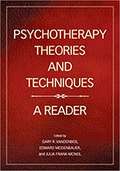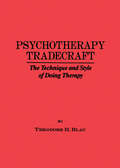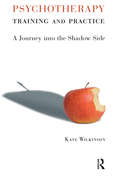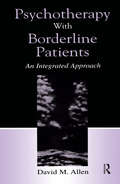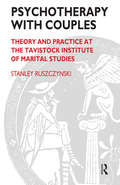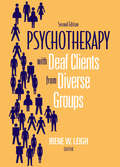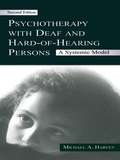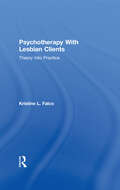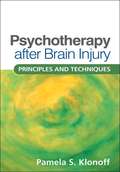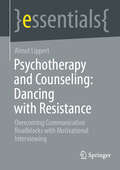- Table View
- List View
Psychotherapy Essentials To Go: Achieving Psychotherapy Effectiveness
by Molyn Leszcz Clare Pain Robert Maunder Paula Ravitz Jon HunterA quick-reference, multi-media guide to practical psychotherapy skills that improve client outcomes. Rigorously field-tested by on-the-ground clinicians, these practical guidebooks--sold separately or as a set--provide easy-to-use, evidence-based summaries of five core therapy techniques. Filled with self-test questionnaires, case studies, diagrams, exercises and role play transcripts, they are ideal teaching and learning resources. Accompanying each guide is a DVD featuring an hour-long video of sample therapy sessions and clinical explications, as well as a handy pocket-reminder card that summarizes key information about the therapy technique. An on-the-go package of essential tools that busy clinicians won't want to be without. The final book in the Psychotherapy Essentials to Go series, this hands-on guide, with accompanying DVD of sample therapy sessions, answers the question: What makes a therapist effective? Several evidence-based strategies are presented to improve outcomes. Maintaining a therapeutic alliance and reducing impasses by understanding relational dynamics, attachment, trauma, and countertransference are all emphasized as helpful aspects of a clinician's repertoire in challenging treatment situations.
Psychotherapy Essentials to Go: Cognitive Behavioral Therapy for Anxiety
by Robert Maunder Paula Ravitz Mark Fefergrad Peggy RichterA quick-reference, multi-media guide to using cognitive behavioral therapy (CBT) to treat anxiety. From fundamental skills to more detailed clinical application across a number of different anxiety disorders--including panic, social anxiety, generalized anxiety, OCD, and specific phobias--this concise guide provides a user-friendly overview of CBT for anxiety so any clinician can begin to implement it with their patients. Techniques for early, middle, and end phases of treatment are covered, including goal-setting and collaborative therapeutic engagement with clients, as well as methods for interoceptive exposure, challenging avoidance, and employing the thought record. Included in this comprehensive guide are a DVD of sample therapy sessions and clinical explication that describe how to implement the protocol, as well as a laminated pocket reminder card. An on-the-go package of practical tools that busy clinicians won't want to be without. Please note that the ebook version of this title does not include the DVD.
Psychotherapy Essentials to Go: Cognitive Behavioral Therapy for Depression
by Robert Maunder Paula Ravitz Mark Fefergrad Ari ZaretskyA quick-reference, multi-media guide to using cognitive behavioral therapy (CBT) to treat depression. A widely researched protocol for treating major depressive disorder, Cognitive Behavioral Therapy (CBT) helps clients feel better and cope more effectively by teaching them essential skills to become their own therapists. This guide explains the basic cognitive model, the therapeutic stance, and some of the most important cognitive and behavioral interventions for depression, equipping clinicians with all the key information they need to begin treatment. Core strategies covered include how to nurture the therapeutic rapport, focusing on the "here and now", goal-setting, and behavioral activation techniques such as activity monitoring, the thought record, and behavioral experiments. An invaluable overview of techniques to challenge clients' negative automatic thoughts and depressive behaviors in order to promote immediate and durable change. Included in this comprehensive guide are a DVD of sample therapy sessions and clinical explication that describe how to implement the protocol, as well as a laminated pocket reminder card. An on-the-go package of practical tools that busy clinicians won't want to be without. Please note that the ebook version of this title does not include the DVD.
Psychotherapy Essentials to Go: Dialectical Behavior Therapy for Emotion Dysregulation
by Robert Maunder Paula Ravitz Shelley Mcmain Carmen WiebeA quick-reference, multi-media guide to using dialectical behavior therapy (DBT) to treat affect dysregulation. Developed by Marsha Linehan, PhD, Dialectical Behavior Therapy (DBT) is an evidence-based treatment for borderline personality disorder that integrates principles of change and acceptance in order to help clients who have severe emotion dysregulation and impulsive behavior. This guide describes the primary tenets of DBT and illustrates some of its essential techniques--namely validation, commitment strategies, behavioral chain analysis, and skills coaching--that can be used with a range of clients. By understanding underlying problems and balancing compassionate acceptance with a push for change, clinicians can use DBT basics in their day-to-day work to help clients manage emotion dysregulation and impulsive urges. Included in this comprehensive guide are a DVD of sample therapy sessions and clinical explication that describe how to implement the protocol, as well as a laminated pocket reminder card. An on-the-go package of practical tools that busy clinicians won't want to be without.
Psychotherapy Essentials to Go: Interpersonal Psychotherapy for Depression
by Robert Maunder Paula Ravitz Sophie Grigoriadis Priya WatsonA quick-reference, multi-media guide to using interpersonal psychotherapy (IPT) to treat depression. Interpersonal Psychotherapy (IPT) is an evidence-supported, short-term therapy that focuses on universal life problems involving change, loss, and conflict in relationships, particularly when these problems relate to depression. At its heart is an emphasis on relationships as a healing force during stressful life events. This guide walks readers through the core principles of IPT treatment--how to consider underlying psychological and biological factors that may predispose a client to depression, including insecure attachment; how to effectively communicate with clients to improve their relationship problems; and how to conduct "interpersonal inventories" to help clients connect to a support system that may be helpful in their recovery process. Included in this comprehensive guide are a DVD of sample therapy sessions and clinical explication that describe how to implement the protocol, as well as a laminated pocket reminder card. An on-the-go package of practical tools that busy clinicians won't want to be without. Please note that the ebook version of this title does not include the DVD.
Psychotherapy Essentials to Go: Motivational Interviewing for Concurrent Disorders
by Robert Maunder Paula Ravitz Carolynne Cooper Wayne SkinnerA quick-reference, multi-media guide to using Motivational Interviewing (MI) to treat co-occurring disorders. Addiction--whether to alcohol and drugs, sex, gambling, or Internet use--and mental health problems often go hand-in-hand. This concise book summarizes the key principles of a particular therapeutic approach to concurrent disorders, Motivational Interviewing (MI), which guides clients in eliciting and strengthening their desire for change. Laying out a four-stage treatment model--engagement, preparation, active treatment, and continuing care--the book walks readers through key facets of the therapeutic rapport at the heart of MI: working collaboratively on goals; connecting to the patient by understanding his or her strengths, needs, and concerns; and using the core MI skills of open questions, affirmations, reflections, and summaries ("OARS"). Readers are immersed in the spirit of MI through explanations and illustrations, preparing them for the practical challenges of therapeutic work with clients who suffer from addiction and mental health problems. Included in this comprehensive guide are a DVD of sample therapy sessions and clinical explication that describe how to implement the protocol, as well as a laminated pocket reminder card. An on-the-go package of practical tools that busy clinicians won't want to be without. Please note that the ebook version of this title does not include the DVD.
Psychotherapy For Personality Disorders
by Glen O. Gabbard John G. GundersonDefined by stable, long-term, subjective distress and/or social impairment, personality disorders affect up to 18% of the population. Social impairment and health care usage are far more prevalent among people with personality disorders than among people with major depressive disorders. Personality disorders are highly prevalent, variable, and notoriously difficult to treat, and they continue to challenge the therapeutic community and represent a formidable public health concern. This volume ably addresses personality disorders as one of the top priorities of psychiatry for the new millennium, offering a thorough and updated review and analysis of empirical work to point up the issues central to developing a therapeutic model for treatment as well as current research challenges. A review of extant research yields the heartening conclusion that psychotherapy remains an effective treatment for people with personality disorders. An examination of psychodynamic treatment for borderline personality disorder speaks to its efficacy. An analysis of the rationale for combining psychotherapy and psychopharmacology emphasizes the importance of identifying temperament and target conditions. A well-documented and reasoned treatise on antisocial personality disorder makes the crucial point that clinicians must acquire a depth of understanding and skill sufficient to determine what the cut-off point is for treatable versus nontreatable gradations. With the caveat that evidence supporting the efficacy of cognitive treatments for personality disorders is slight and that such approaches require tailoring, a strong case is made for their validity. This timely volume both answers and reframes many stubborn questions about the efficacy of psychotherapy for treating personality disorders.
Psychotherapy For The Advanced Practice Psychiatric Nurse: A How-To Guide For Evidence-Based Practice (Second Edition)
by Kathleen WheelerThis is a how-to compendium of evidence-based approaches to practicing psychotherapy for both the experienced and neophyte advanced practice psychiatric nurse. This book integrates neuroscience with relationship science and unites disparate psychotherapeutic approaches into a model that is concise and straightforward, yet sufficiently comprehensive to provide a framework for practice. <P><P>The most useful therapeutic models are highlighted with principles, and techniques of treatment for nurse psychotherapists and those with prescriptive authority. This second edition expands the award-winning first edition, providing guidelines, forms, and case studies to assist APPNs in deciding which treatment to use based on psychotherapy outcome studies and practice guidelines.
Psychotherapy Meets Emotional Neuroscience: The Two Minds of Cognition and Feeling
by Gilbert PughPsychotherapy Meets Emotional Neuroscience: The Two Minds of Cognition and Feeling introduces new insights from the neurosciences into the nature of our emotions and feelings, and argues for a more empathetic approach to psychotherapy as a result. Respectful of Freud the neurologist and explorer of the mind, the book seeks to contextualise psychoanalytic theory with recent discoveries in how emotions are generated in the brain, as well as those around memory, to clarify key psychological processes such as projection and transference. It includes sketches of a number of influential analysts whose emphasis has been on a close, affective relationship with their patients—including Ferenczi, Kohut and Winnicott—and explains why, in the light of recent research, empathy is necessary for any effective psychotherapeutic relationship. There are also chapters on the use of drugs to complement psychotherapy, and how the free energy principle can explain brain functioning. In an era when neuroscientific research has provided far-reaching discoveries into how our brains work, this clear-sighted, accessible overview will offer psychotherapists and psychoanalysts, whether practicing or training, or indeed non-professionals seeking therapy for personal reasons, a way of incorporating new knowledge into their understanding of their patients and themselves.
Psychotherapy Of The Borderline Adult: A Developmental Approach
by James F. Masterson, M.D.First published in 1988. This volume brings diagnostic order, a comprehensible theory, and a clinical approach out of the confusion surrounding the "borderline" concept.
Psychotherapy Relationships That Work: Evidence-Based Responsiveness
by John C. NorcrossFirst published in 2002, the landmark Psychotherapy Relationships That Work broke new ground by focusing renewed and corrective attention on the substantial research behind the crucial (but often overlooked) client-therapist relationship. This thoroughly revised edition brings a decade ofadditional research to the same task. In addition to updating each chapter, the second edition features new chapters on the effectiveness of the alliance with children and adolescents, the alliance in couples and family therapy, real-time feedback from clients, patient preferences, culture, andattachment style. The new editon provides "two books in one" - one on evidence-based relationship elements and one on evidence-based methods of adapting treatment to the individual patient. Each chapter features a specific therapist behavior that improves treatment outcome, or a transdiagnostic patient characteristic(such as reactance, preferences, culture, stage of change) by which clinicians can effectively tailor psychotherapy. All chapters provide original, comprehensive meta-analyses of the relevant research; clinical examples, and research-supported therapeutic practices by distinguished contributors. Theresult is a compelling synthesis of the best available research, clinical expertise, and patient characteristics in the tradition of evidence-based practice. The second edition of Psychotherapy Relationships That Work: Evidence-Based Responsiveness proves indispensible for any mental health professional.
Psychotherapy Research
by Omar C.G. Gelo Alfred Pritz Bernd RiekenThis book provides readers with essential information on the foundations of psychotherapy research, and on its applications to the study of both psychotherapy process and outcome. The aim is to stimulate a reflection on these issues in a way that will benefit researchers and clinicians, as well as undergraduate and graduate students, at different levels and from different perspectives. Accordingly, the book presents a balanced mix of chapters summarizing the state of the art in the field from different viewpoints and covering innovative topics and perspectives, reflecting some of the most established traditions and, at the same time, emerging approaches in the field in several countries. The contributors, who were invited from among the experts in our national and international professional networks, also represent a healthy mix of leading figures and young researchers. The first part of the book addresses a number of fundamental issues in psychotherapy research at a historical, philosophical, and theoretical level. The second part of the book is concerned with research on psychotherapy processes; in this regard, both quantitative and qualitative approaches are given equal consideration in order to reflect the growing relevance of the latter. The book's third and last part examines research on psychotherapy outcomes, primarily focusing on quantitative approaches. Offering a balanced mix of perspectives, approaches and topics, the book represents a valuable tool for anyone interested in psychotherapy research.
Psychotherapy Revised: New Frontiers in Research and Practice
by E. Lakin PhillipsFirst published in 1985. Routledge is an imprint of Taylor & Francis, an informa company.
Psychotherapy Theories and Techniques: A Reader
by Gary R. VandenBos Edward Meidenbauer Julia Frank-McNeilPsychotherapy Theories and Techniques explores the richness and variety of psychotherapy in a collection of carefully chosen excerpts from APA publications. Intended for students and practitioners, this volume provides a unique look at contemporary psychotherapy theory and the specific interventions associated with each orientation. <p><p> All major approaches in psychotherapy are included—everything from cognitive–behavioral therapy to psychoanalytic therapy—as well as newer approaches such as acceptance and commitment therapy and schema therapy.
Psychotherapy Tradecraft: The Technique & Style Of Doing Therapy
by Theodore H. BlauFirst published in 1988. Routledge is an imprint of Taylor & Francis, an informa company.
Psychotherapy Training and Practice: A Journey into the Shadow Side
by Kate WilkinsonAn exploration of the extensive intra-personal, interpersonal and group dynamic landscape of human experience pertinent to the understanding of the human shadow in the training of psychotherapists. Using phenomenological enquiry this book invites unique, in-depth experiences, provides new insights and addresses the complexities and diversities inherent in the emergence and containment of shadow experience in psychotherapy training. This book takes the reader through a process of qualitative research and invites the reader to explore his or her own relationships to the love of others, through the exploration of all the things that love is not. It argues that without hate we cannot truly love. Interspersed throughout the book are suggestions for personal exploration and it is hoped that reading this book will both stimulate practitioners to a process of self-reflection and questioning, and also support practitioner researchers in their own journey to self-understanding.
Psychotherapy Under the Influence of Georges Bataille: From Social Theory to Clinical Practice
by William BuseThis fascinating book applies social theorist Georges Bataille’s revolutionary thinking to psychotherapy, offering clinicians a new and valuable context for practicing therapy. In adding Bataille’s ideas to several different psychotherapeutic modalities, this book makes the notoriously obscure thinker more accessible while testing the validity of his far-reaching work in the treatment room. Through an in-depth examination of several clinical case studies, the book demonstrates how to balance an understanding of the social and historical contexts of participants with a therapeutic approach that offers empathy for individual distress. It also explains how Bataille’s innovative approach can be applied to work with couples, groups, institutions, and even one of Freud’s classic case studies. Both the content and form of each chapter demonstrate the therapeutic value of a reflexive, critical approach to one’s practice and exemplify how to write about it. Offering an unprecedented opportunity to imagine how Bataille’s own interest in psychoanalysis and clinical psychology might have developed, this book will be of interest to both practitioners in the field and scholars of continental philosophy and social theory.
Psychotherapy With Borderline Patients: An Integrated Approach
by David M. AllenPatients with borderline personality disorder (BPD) or borderline traits are among the most difficult for mental health practitioners to treat. They present an incredible range of symptoms, dysfunctional interpersonal interactions, provocative behavior in therapy, and comorbid psychiatric disturbances. So broad is this array that indeed the disorder constitutes a virtual model for the study of all forms of self-destructive and self-defeating behavior patterns. Psychotherapy With Borderline Patients: An Integrated Approach fills the need for a problem-focused, clinically oriented, and operationalized treatment manual that addresses major ongoing family factors that trigger and reinforce the patient's self-destructive or self-defeating behavior. In it, David Allen draws on the theoretical ideas and techniques of biological, family systems, psychodynamic, and cognitive-behavioral therapists to describe an integrated approach to adults with BPD or borderline traits in individual therapy. Innovative, practical, and specific, the book * helps therapists teach their patients, through the use of various role-playing techniques, strategies to alter the dysfunctional patterns of interaction with their families of origin that reinforce self-destructive behavior or chronic affective symptoms; * explains the nature and origins of the characteristic oscillation of hostile over- and underinvolvement between adults with BPD and those who served as their primary parental figures during childhood; * elucidates the nature and causes of the dysfunctional communication patterns in patients' families that lead to misunderstanding; and * provides concrete, clearly spelled out advice for therapists about how to deal with provocative patient behavior, how to minimize distorted descriptions by patients of significant others, how to avoid patients' misuse of medications, and how to respond to managed care restrictions on patients' insurance coverage. Psychotherapy With Borderline Patients: An Integrated Approach will be welcomed by all clinicians who work with these patients, whatever their training or theoretical orientation.
Psychotherapy With Couples: Theory and Practice at the Tavistock Institute of Marital Studies
by Stanley RuszczynskiA thought provoking, persuasive, challenging, and above all practical guide for beginners and more experienced therapists alike. It shows the demands and complexity of marital work and is an important reminder of the interdependence of theory and practice.
Psychotherapy With Deaf Clients From Diverse Groups
by Irene W. LeighThe second edition of Psychotherapy with Deaf Clients from Diverse Groups features the introduction of six new chapters that complement full revisions of original chapters with advances in the field since its initial publication. The first part begins with a new chapter on the current ethical issues relevant to working with deaf clients. In subsequent chapters it provides updated information on the diversity of consumer knowledge, attitudes, beliefs, and experiences. Deaf therapists and their involvement in the Deaf community also are scrutinized in this context. The revised second part examines psychotherapy for various constituencies, including deaf women; lesbian, gay, and bisexual deaf populations; children of deaf parents; and people with Usher syndrome. Part Three chapters consider interventions with African American deaf clients, American Indians who are deaf, and Asians who are American and deaf. A new chapter expands information on therapy for Latino deaf clients. The final section incorporates three new chapters on other deaf populations -- deaf college students, recipients of cochlear implants, and deaf elderly clients. Also, new information has been added to chapters on the treatment of deaf survivors of sexual abuse and deaf clients with chemical dependency. The last addition to the second edition outlines dialectical behavior therapy for deaf clients, a valuable option for clinicians.
Psychotherapy With Deaf and Hard of Hearing Persons: A Systemic Model
by Michael A. HarveyIn this expanded and thoroughly updated second edition, Michael A. Harvey elaborates his pioneering biopsychosocial model of the effective assessment and treatment of deaf and hard-of-hearing clients in individual and family therapy. Taking a broad ecological perspective, he examines the influences of larger networks on the individual and vice versa, and illuminates the overt and covert conflicts among family members, school and vocational rehabilitation personnel, and friends that often exacerbate problems. The spiritual issues relevant to those who have experienced any kind of loss receive special attention in the new edition, as do the daily hurtful exchanges in the lives of the deaf he sums up as "ordinary evil." Throughout the reader-friendly text, theoretical description is balanced with practical advice; points are vividly illustrated with extended verbatim transcripts from actual therapy sessions and with exchanges in the author's question-and-answer column in the journal, Hearing Loss: Self-Help for the Hard of Hearing. Psychotherapy With Deaf and Hard-of-Hearing Persons, Second Edition, is essential reading for all mental health professionals who see even occasional clients whose lives have been affected by hearing loss in themselves or in family members.
Psychotherapy With Lesbian Clients: Theory Into Practice
by Kristine L. FalcoAn explanation of who lesbians are, how psychotherapy with this population is unique, how therapists and patients are influenced by homophobia and what the therapist brings to the therapeutic relationship. It presents models of lesbian-affirmative psychotherapy and offers guidelines for therapists.
Psychotherapy after Brain Injury
by Pamela KlonoffThis book presents hands-on tools for addressing the multiple ways that brain injury can affect psychological functioning and well-being. The author is a leader in the field who translates her extensive clinical experience into clear-cut yet flexible guidelines that therapists can adapt for different challenges and settings. With a focus on facilitating awareness, coping, competence, adjustment, and community reintegration, the book features helpful case examples and reproducible handouts and forms. It shows how to weave together individual psychotherapy, cognitive retraining, group and family work, psychoeducation, and life skills training, and how to build and maintain a collaborative therapeutic relationship.
Psychotherapy and Aphasia: Interventions for Emotional Wellbeing and Relationships
by Kate H. Meredith Giles N. YeatesPsychotherapy and Aphasia: Interventions for Emotional Wellbeing and Relationships is an exciting international collaboration among clinical neuropsychologists, speech and language therapists and family therapists that details a range of innovative psychotherapeutic interventions to enable people with communication disorders and their families to access meaningful support. People with aphasia and other acquired communication disorders can face significant challenges accessing emotional support. Many traditional forms of psychotherapy are based on spoken language, rendering it inaccessible for many people with communication disorders. But the book details a range of techniques that move away from reliance on spoken language, including total communication strategies, the use of meaningful objects, experiential process, group experience and mind-body practices. Featuring clinical examples which cover a range of stroke and neurology service contexts, the book includes contributions from a range of therapeutic models; from speech and language therapy and family therapy to clinical neuropsychology, cognitive-behavioural, systemic, narrative and mind-body traditions. It therefore provides clinicians with a wide-range of practical and theoretical tools to explore when supporting survivors who experience psychological distress during rehabilitation. It is the only book aimed at both speech and language therapists and psychotherapists, and will open up new pathways to support.
Psychotherapy and Counseling: Overcoming Communication Roadblocks with Motivational Interviewing (essentials)
by Almut LippertThis essential guide helps you better understand and resolve client resistance in therapy and counseling contexts. The frustrating “Yes, but…” or “That won’t work because…” debates are familiar to most practitioners. It’s easy for the patient to be labeled as resistant or unmotivated, and therapists often respond with frustration or irritation. The approach of Motivational Interviewing offers a new perspective on resistance phenomena, understanding resistance primarily as an interactional phenomenon. Building on this, communication techniques are explained to help break down or prevent conversational blockages. Practical examples ease the transfer of these techniques into everyday professional practice.
